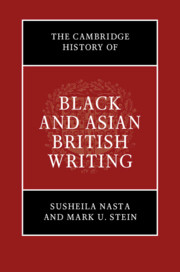Book contents
- The Cambridge History of Black and Asian British Writing
- The Cambridge History of Black and Asian British Writing
- Copyright page
- Dedication
- Contents
- Notes on Contributors
- Preface and Acknowledgements
- Introduction
- Part I New Formations
- Part II Uneven Histories
- (I) Global Locals
- 6 Between the Wars
- 7 Mobile Modernisms
- 8 Establishing Material Platforms in Literary Culture in the 1930s and 1940s
- 9 Transnational Cultural Exchange
- 10 Political Autobiography and Life-Writing
- 11 Staging Early Black and Asian Drama in Britain
- (II) Disappointed Citizens
- (III) Here to Stay
- Part III Writing the Contemporary
- Select Bibliography
- Index
6 - Between the Wars
Caribbean, Pan-African, and Asian Networks
from (I) - Global Locals
Published online by Cambridge University Press: 19 December 2019
- The Cambridge History of Black and Asian British Writing
- The Cambridge History of Black and Asian British Writing
- Copyright page
- Dedication
- Contents
- Notes on Contributors
- Preface and Acknowledgements
- Introduction
- Part I New Formations
- Part II Uneven Histories
- (I) Global Locals
- 6 Between the Wars
- 7 Mobile Modernisms
- 8 Establishing Material Platforms in Literary Culture in the 1930s and 1940s
- 9 Transnational Cultural Exchange
- 10 Political Autobiography and Life-Writing
- 11 Staging Early Black and Asian Drama in Britain
- (II) Disappointed Citizens
- (III) Here to Stay
- Part III Writing the Contemporary
- Select Bibliography
- Index
Summary
As heart of empire, London was ‘home’ to a number of colonial writers and intellectuals from across the globe. Key figures in the history of black and Asian British writing such as activist George Padmore, the polymath novelist, dramatist, and political philosopher C. L. R. James, the poet, broadcaster, and dramatist, Una Marson, and a number of South Asians including Cedric Dover, Sajjad Zaheer, M. J. Tambimuttu, and Mulk Raj Anand were active also as public intellectuals in a wide range of political organisations and cultural networks including the Pan-African movement, the League of Coloured Peoples (1931), and the Progressive Writers Association (1935). This chapter outlines the histories, interrelationships, and connections across these distinct British-based political and cultural networks; it explores their objectives and demonstrates how their presence in Britain began to generate a number of parallel creative and political projects. These networks were to become of increasing significance in the formation of anti-colonial resistance and political movements in the period prior to Independence and decolonisation after World War II, connecting a number of these major literary figures.
- Type
- Chapter
- Information
- The Cambridge History of Black and Asian British Writing , pp. 99 - 115Publisher: Cambridge University PressPrint publication year: 2020



